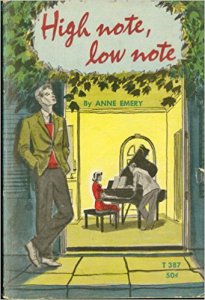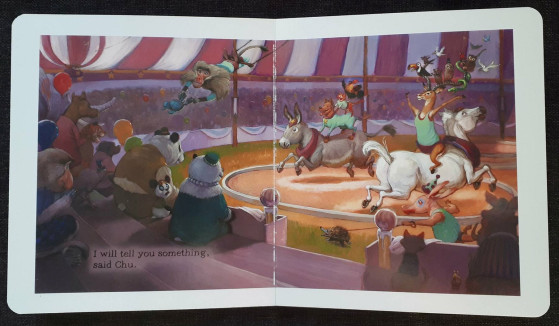- Senior Year
- Going Steady
- Sorority Girl
- High Note, Low Note
- Campus Melody
These are happy if somewhat unexciting books published back in the 1950’s by my old favorite Scholastic Book Service. I can’t tell you how many of those 1950’s Scholastic paperbacks I have picked up for a dime at various book sales and garage sales, basically guaranteed to be good for at least one read.
And now I own even more because I only started with two of these books and ended up buying the other three on eBay. :-D (Because yes, my quest to read all of my own books sometimes involves needing to buy more books to accomplish this…)

//published 1949//
Senior Year focuses on Sally Burnaby, the oldest of five children, who is – you guessed it – a high school senior. She’s excited about this final year of high school because she has a great life and figures that this grand finale will be even better. She’s anticipating a year of fun and frolic, and also looking forward to going away to college – getting out of the house and away from the family for the first time. Of course, not all is a bed of roses. Sally’s best friend from childhood has received a special gift from an elderly relative and spending their senior year away at a boarding school, leaving Sally – who is something of a follower – feeling a bit adrift. Her other best friend/long-time date/neighbor, Scotty, suddenly doesn’t seem as interested in escorting Sally on dates anymore, maybe because Sally has suddenly started thinking that going steady with Scotty might be nice.
I was honestly surprised at the casual way in which Emery approached some more difficult subjects. Modern writers and readers frequently dismiss these older books as no longer relevant, because apparently everyone in the 50’s lived in a Leave It to Beaver sort of dream world. But despite the fact that the Burnabys are a close-knit and happy family with two parents who love each other very much, and a mother who doesn’t work outside the home, the challenges and struggles that Sally face seemed quite modern to me. She struggles with disagreeing with her parents on how she should be living her life and spending her time, struggling with that strange moment in time where you are still under your parents’ authority but are starting to become an adult, struggles with friends who are drinking and becoming more sexually involved than Sally was comfortable with (not in an explicit way, but being explicit isn’t actually necessary). She struggles to find her true self, to understand what is really important in a friend, and learn whether it’s worth sacrificing standards just to avoid being single.

//published 1950//
In short, I really enjoyed watching Sally’s character develop and grow, which carried over in Going Steady. In this book, Sally and Scotty decide to become a couple during the summer after they graduated from high school. They have been good friends their entire lives, and this feels like the natural next step. This book got a little too much about Scotty and felt repetitive at times, but still felt honest nonetheless. I really loved one section of the book where one of Sally’s high school friends has gotten married right away, and then got pregnant right away. At this point in time, Sally and Scotty are feeling rebellious because their families think they are moving too fast, and they have also decided to get married. When they go to visit Sally’s newlywed friends, however, they recognize the wisdom of a lot of what their parents have had to say about the financial struggles of getting married so soon and other difficulties that really only work if you have a genuine foundation of lasting love – which Scotty and Sally are starting to realize they don’t actually have.
This was such an intriguing book to me because, in the end, the guy doesn’t get the girl – the girl gets single and realizes how happy she can be that way. It wasn’t in this crazy feminist “a girl never needs a man” kind of way. Instead, this book was really about how love works best when it happens at the right time instead of being rushed. It wasn’t the right time for Sally and Scotty, and when they realized that, they were able to look to their futures in a more healthy, happy way. Throughout the story, Sally had clung to her relationship with Scotty because being single seemed like such a terrible fate. But int he end I love that she decides that it’s time “to be the kind of person who could have fun without a man.” Not because relationships are inherently bad, but because being in one with the wrong person just so you aren’t alone is.

//published 1952//
The next three book focus on Sally’s sister, Jean, who is two years younger. I was a little sad to leave Sally behind, but Jean is also a likable individual who had shown up quite a bit during the first two books. Sorority Girl opens during Jean’s junior year of high school, right after the ending of Going Steady. Sally is now attending their local college (where their father is a professor), so we do see her here and there, along with her new boyfriend, who is just adorable. Throughout the first two books, Jean began hanging out with Jeff, who is her regular escort to various events, but not her official boyfriend. They’re very close, though. In the background of Sally’s books, Jean was finding her feet and becoming more outgoing, and is now thoroughly involved in high school activities with a close circle of friends.
I appreciated that Jean is really quite a different character from Sally. Sally is quieter and follower who had to learn how to make her own way. Jean is more outgoing and fun, and also more dependent on having people like her. She’s very musical and is starting to think that she may be able to make a career of playing the piano.
However, things change when she is approached by the members of the high school sorority. Technically, groups and clubs that “seeks to perpetuate itself by taking on its members on the basis of personal preference of its membership, rather than upon the stated qualifications for membership.” But some allowances are made in a sort of “we pretend we don’t notice” kind of way, for two sororities and two fraternities. Jeans adventures with becoming and joining the Nightingales were quite interesting to me. Watching Jean get caught up in the “honor” of becoming part of an exclusive group, and then watching her realize that this mean also excluding people she likes and admires, was insightful. There was a lot to learn from this book, and I appreciated that Jean didn’t just magically wake up perfect, but really wrestled – not just with figuring out what was the right thing to do, but then actually doing that right thing even after she knew what it was.

//published 1954//
High Note, Low Note follows Jean through her senior year. She and Jeff are going steady, and both are looking to the future. However, Jean feels uncomfortable because Jeff is a lot more serious about their future being together than she is. This one was a little too much about boys to be as enjoyable as some of the others, but still read well.

//published 1955//
Finally, Campus Melody follows Jean to her freshman year at college, where she is attending on a music scholarship. This was a good book about that initial adjustment to living away from home – away from that support system that you almost don’t even realize is guiding you throughout your teen years. Jean makes some rather poor decisions and learns from them, especially involving a popular senior on campus who starts dating her.
I think the only thing that disappointed me in this book was the ending, which I felt like was a bit of a cop-out and didn’t actually fit with all the lessons Jean had been learning throughout the story. However, it did mean that everything tied together neatly, so I was willing to forgive it a bit.
All in all, this review has been a lot longer and more rambly than I anticipated, but I really did enjoy this little series. They weren’t ground-breaking books, but they were pleasant and engaging reads. At my age, I think what I actually enjoyed the most were the parenting techniques of Mr. and Mrs. Burnaby, who were really fantastic background characters with a lot to offer.
One note – for some reason Goodreads does not have this series listed in the proper order. Instead, they list Sorority Girl as book #5, when, by both publishing date and chronologically to the overall story, it is obviously #3. Reading books in their proper order is extremely important to me, so I found that bit of misinformation to be quite aggravating.
Most of these books were a 3-4/5 for me, and I think the series as a whole is a 3.5/5. While they aren’t ground-breaking literature, and could be a bit repetitive in parts, I think they have just as much to offer in terms of life-lessons and pleasurable reading as 85% of contemporary YA – and all without the sex, swearing, and divorce!
Advertisements Share this:




